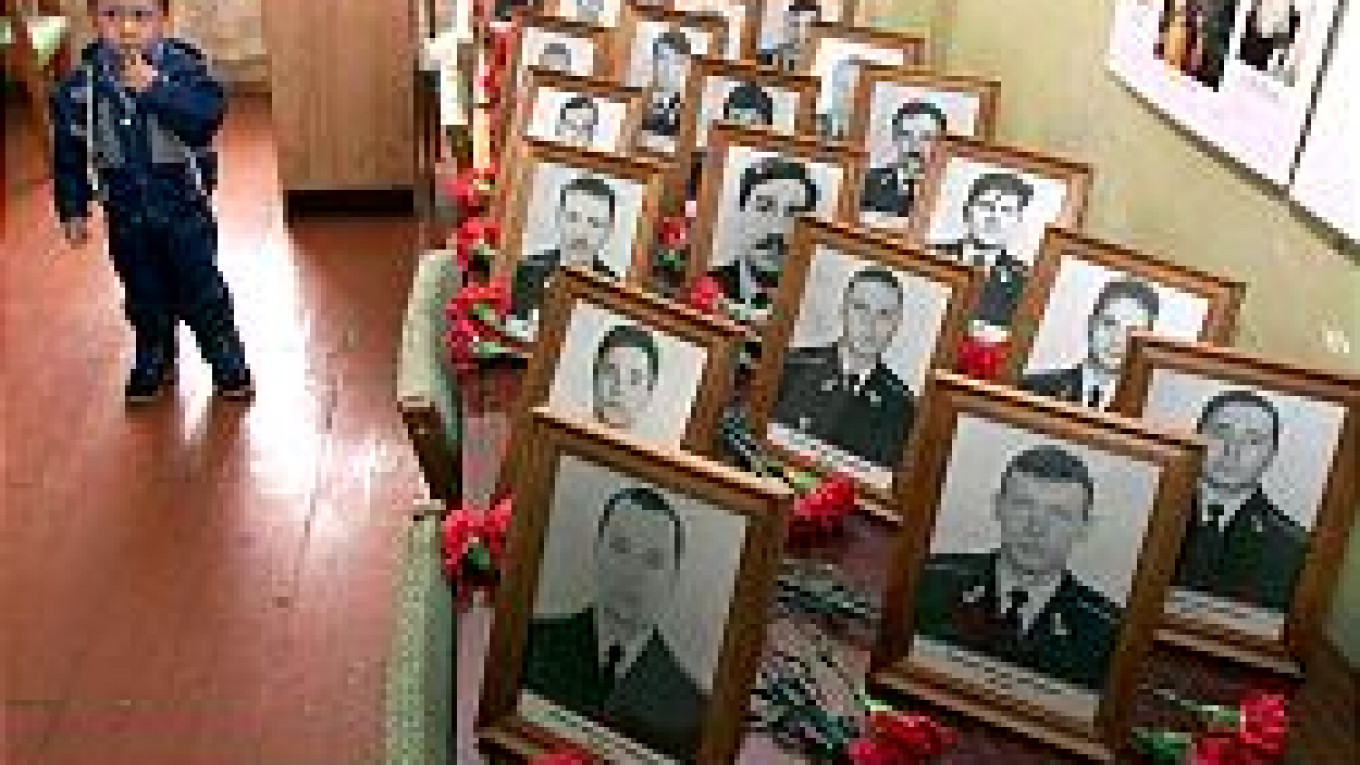As morning drizzle gave way to clear skies, the families observed a moment of silence in the small Arctic port of Vidyayevo before placing bouquets at a monument.
Women sobbed and men wiped their eyes as a brass band played a dirge. Small children clung to their mothers' fingers.
A new stone in honor of the 118 victims of the Kursk disaster was added to the simple hilltop monument that honors all Russian submariners lost at sea.
The families later walked down to a pier and tossed flowers into the still water near to the hulk of another docked sub. A white motor launch sailed slowly nearby, carrying sailors in dress uniforms who tossed wreaths into the glassy sea.
At precisely 11:32 a.m., the moment when explosions sank the Kursk, ships of the Northern Fleet lowered flags to half mast.
A separate ceremony was held in the Serafimovskoye Cemetery in St. Petersburg, where two of 12 bodies recovered by divers last year are buried.
"The sorrow of our loss will never leave our hearts. Every day, every minute, I remember him," said Irina Kolesnikova, whose son Dmitry is buried in the cemetery.
A note that Dmitry penned in the darkness and was recovered with his body proved that some members of the crew survived the blasts that sank the Kursk during a training mission on Aug. 12, 2000, only to die slowly, trapped beneath the waves. Dmitry's wife, Olga, clutched a large bouquet of white calla lilies. The note he penned had begun: "Little Olga, I love you."
"In the letter he said we must not despair. But we despair anyway," his mother said.
The relatives later moved to a church in St. Petersburg, where they held candles for a memorial service, surrounded by hundreds of sailors and officers in dress uniforms.
An international team of divers is working on the floor of the Barents Sea, bolting cables to the 150-meter submarine so that it can be hoisted to the surface next month. The $65 million salvage project aims to fulfill a promise President Vladimir Putin made to the families of the crew to bury them onshore.
The Kursk disaster gave rise to an intense national outpouring of sorrow. But the deep sadness has also been tainted with anger. It took the navy days to first report a "malfunction" on board the sub. From the outset, much of the information released quickly proved to be false.
But Russian officials are now bending over backward to show that they have learned their lesson from the initial coverup, holding news conferences at home and abroad and setting up bilingual web sites to discuss the salvage operation. They have yet to offer a full explanation of what caused the submarine to sink, although official versions suggest faulty torpedoes were to blame.
Admiral Vladimir Kuroyedov, commander of the navy and the highest-ranking official to attend the ceremony in Vidyayevo, told the mourning families that finding out the cause of the sinking remained "task No. 1."
"It is vitally important for us to know what events killed this fighting ship. Otherwise we will never know the condition of the Russian fleet," he said.
But Kolesnikova said she has little faith that the navy will ever finally reveal what killed her son.
"I want to believe [we will know the cause]. But judging by last year, this will be very difficult," she said.
 President Putin on Friday presented the widow of the Kursk's commander, Captain Grigory Lyachin, with the Hero of Russia medal, The Associated Press reported.
President Putin on Friday presented the widow of the Kursk's commander, Captain Grigory Lyachin, with the Hero of Russia medal, The Associated Press reported.A Message from The Moscow Times:
Dear readers,
We are facing unprecedented challenges. Russia's Prosecutor General's Office has designated The Moscow Times as an "undesirable" organization, criminalizing our work and putting our staff at risk of prosecution. This follows our earlier unjust labeling as a "foreign agent."
These actions are direct attempts to silence independent journalism in Russia. The authorities claim our work "discredits the decisions of the Russian leadership." We see things differently: we strive to provide accurate, unbiased reporting on Russia.
We, the journalists of The Moscow Times, refuse to be silenced. But to continue our work, we need your help.
Your support, no matter how small, makes a world of difference. If you can, please support us monthly starting from just $2. It's quick to set up, and every contribution makes a significant impact.
By supporting The Moscow Times, you're defending open, independent journalism in the face of repression. Thank you for standing with us.
Remind me later.


